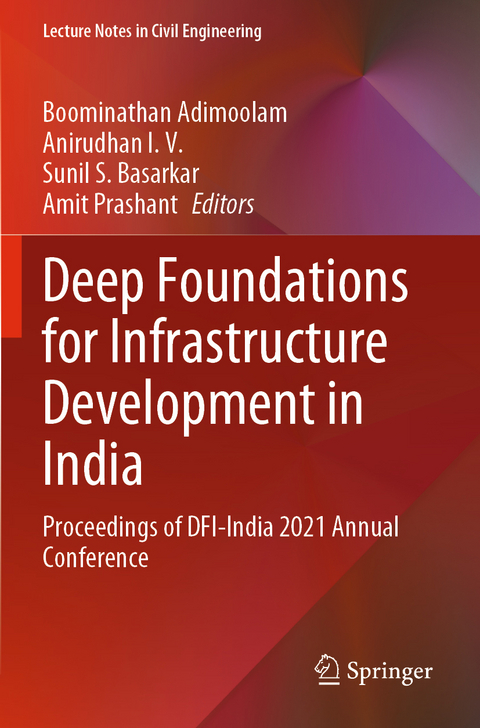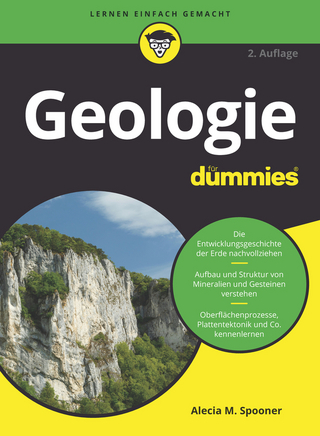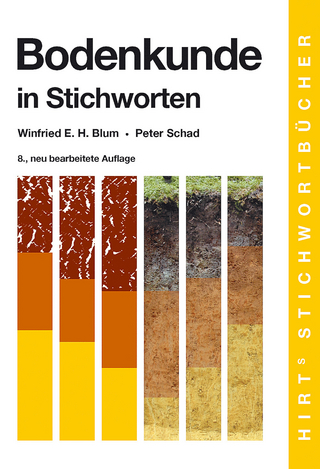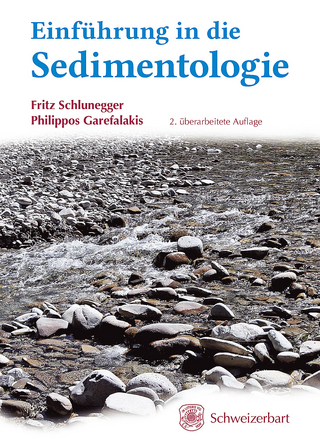
Deep Foundations for Infrastructure Development in India
Springer Verlag, Singapore
978-981-19-8600-0 (ISBN)
Dr. Boominathan Adimoolam is an active academician, researcher and consultant in the area of geotechnical engineering. His expertise includes soil dynamics and earthquake geotechnical engineering, deep foundations and ground improvement. He received his Ph.D. in Geotechnical Engineering from Moscow Civil Engineering Institute in 1986. Dr. A. Boominathan was a Professor of Geotechnical Engineering at the Department of Civil Engineering at IIT Madras until his retirement in June 2021. He has guided 16 Ph.D., 11 M.S. by research and severalM.Tech. students. He has authored more than 196 scientific publications, including more than 62 articles in refereed journals. Dr. A. Boominathan is a member of the editorial board of the Journal of Earthquake & Tsunami. He is a fellow of the Indian Geotechnical Society, a National Executive member of Deep Foundation Institute (DFI) of India and Associate Member of American Society of Civil Engineers (ASCE). He is also an honorary fellowof the National Engineering Academy of the Republic of Kazakhstan. He is a member of several technical committees of the International Society of Soil Mechanics and Geotechnical Engineering (ISSMGE). He has received the IGS Shri M. S. Jain Biennial Prize in 2004, and the IGS Prof. C. S. Desai Biannual Prize in 2012. Recently he has been selected for the A. S. Arya Disaster Prevention Award, a research award of IIT Roorkee. Anirudhan I. V. is a Geotechnical Consultant based in Chennai, India. His career as an independent consultant started in 1987 after associating with a leading consultancy firm for seven years. His major field of expertise are in deep foundations, ground improvement and geotechnical characterisation. His organisation, Geotechnical Solutions, executed more than 2000 small and medium geotechnical investigations andprovided foundation recommendations. He graduated in Civil Engineering with a specialisation in Geotechnical Engineering from IIT Kanpur, India, in 1981 after obtaining B.Sc. Engg. (Hons) in Civil Engineering from the University of Calicut in the year 1979. He is actively involved in the activities of the Indian Geotechnical Society and Deep Foundations Institute of India, and he has conducted several conferences, workshops and seminars. He was a member of TC-302 of ISSMGE on Forensic Engineering, TC-301 of ISSMGE on Historic Sites and the convener of TC-04 of the Indian Geotechnical Society on Geotechnical Investigation. He has authored and published several technical papers,the guideline manuals on lateritic soils, the guideline manual on geotechnical investigation, the design manual for continuous flight augured piles. He is currently the chairman of Deep Foundations Institute of India, and he also served as the chairman and honorary secretary ofthe Chennai Chapter of the IGS. Dr. Sunil S. Basarkar is the Head of Geotechnical Engineering Department at Afcons Infrastructure Ltd Mumbai. He has a total experience of about 18 years in the field and 16 years association with Academia in area of geotechnical engineering. Dr. Basarkar has published more than 50 papers in various national and international conferences and reputed journals. He is a Core Committee Member of DFI of India. Dr. Basarkar is also a fellow of the Institution of Engineers (India), Indian Geotechnical Society, and Institute of Bridge Engineering. Dr. Basarkar also serves as an Editor of DFI Journal (USA). Dr. Amit Prashant is Professor of Civil Engineering and Dean of Research and Development at IIT Gandhinagar. He is currently the Chairman of the Ahmedabad chapter of Indian Geotechnical Society and also a Member of the Board of Governors of SVNIT Surat. He completed his Bachelors of Engineering degree from IIT Roorkee in 1997. After two years of consulting experience, he went for higher studies at ClarksonUniversity,NY and then to University of Tennessee, Knoxville. After completing his doctoral studies and one year of post-doctoral research, he worked at IIT Kanpur as Assistant Professor during 2005–2010, and then moved to IIT Gandhinagar in 2010. He has been actively involved in academic administration, as Chairman, SUGC at IIT Kanpur earlier and for six years as Dean, Academic Affairs at IIT Gandhinagar. With that experience, he was also appointed as the Officiating Director of IIT Gandhinagar during July-September 2019. His research interests are in constitutive modelling of soils, earthquake geotechnical engineering and applications of geosynthetics, which including experimental investigations and numerical modelling. He has done field projects related to hill slopes, excavations, canals, ash-dyke, bridge foundations and barrage, etc. He has conducted several industry courses in earthquake engineering, FEM and geotechnical investigations, which have been quite popular. He also coordinates faculty development programs for last six years under the aegis of TEQIP Scheme of the Government of India for engineering colleges in the country.
Part 1. Geotechnical Investigation, Testing, Instrumentation, Monitoring and Quality Management.- Chapter 1. Advanced Geotechnical Investigation and Data Interpretation for Complex Underground Structures.- Chapter 2. Performance of Stone Columns in Soft Clay - a Comparative Study of Bearing Capacity of Soil Estimated Using IS Code Method, Actual Field Load Tests and Observations from Numerical Model - A Case Study.- Chapter 3. Use of Reliability Based Approach to Determine Geotechnical Parameters of Soil Site.- Chapter 4. Liner Piles Used as Support to Kentledge for Initial Compression Load Test.- Part 2. Ground Improvement Techniques.- Chapter 5. Development of Design Charts for Sand Compaction Pile Method of Improvement for Loose to Medium Dense Sands.- Chapter 6. Ground Improvement Using Stone Columns to Mitigate Liquefaction, Reduce Settlements and to Increase Bearing Capacity of In-Situ Soils - A Case Study.- Part 3. Piling and Deep Foundation Techniques.- Chapter 7. AStudy on the Evaluation of Pile Bearing Capacity Factor and Adhesion Factor in IS 2911.- Chapter 8. How Choice of Foundation Can Alter the Fate of a Bridge Project - 3 Case Studies.- Chapter 9. Soil-Structure Interaction for a Tension Pile Pulled with Strand.- Part 4. Earth Retention and Deep Excavation Support.- Chapter 10. Challenges of Earthen Cofferdam in Deep Excavations for Waterfront Structures, A Case Study.- Chapter 11. Confined Space and Inner-City Projects - Future Challenge and Opportunity for Diaphragm Walling.- Chapter 12. Effects of Change in the Support System on Temporary Secant Pile Wall.- Chapter 13. Overveiw of Enabling Works for Waterfront Structures - Design & Construction.- Chapter 14. Realistic Estimation of Water Table Depth for Design Optimization of Bored Tunnel and Cut & Cover Tunnel Structures for Underground Metro.- Part 5. Research, Experimental and Numerical Methods in Deep Foundations and Deep Excavation Technologies.- Chapter 15. Comparison of Ground Movement near Buildings Due to Underground Station Excavation with Analytical and Numerical Methods.- Chapter 16. Numerical Study on Uplift Capacity of Helical Pile Embedded in Clay.- Part 6. Safe and Efficient Geo-Construction.- Chapter 17. Rectification Measures and Restoration of Distressed Pump Foundations.
| Erscheinungsdatum | 13.04.2024 |
|---|---|
| Reihe/Serie | Lecture Notes in Civil Engineering |
| Zusatzinfo | 114 Illustrations, color; 28 Illustrations, black and white; XV, 221 p. 142 illus., 114 illus. in color. |
| Verlagsort | Singapore |
| Sprache | englisch |
| Maße | 155 x 235 mm |
| Themenwelt | Naturwissenschaften ► Geowissenschaften ► Geologie |
| Technik ► Bauwesen | |
| Schlagworte | Deep Excavation • deep foundation • ground improvement • Monitoring • Testing |
| ISBN-10 | 981-19-8600-2 / 9811986002 |
| ISBN-13 | 978-981-19-8600-0 / 9789811986000 |
| Zustand | Neuware |
| Haben Sie eine Frage zum Produkt? |
aus dem Bereich


